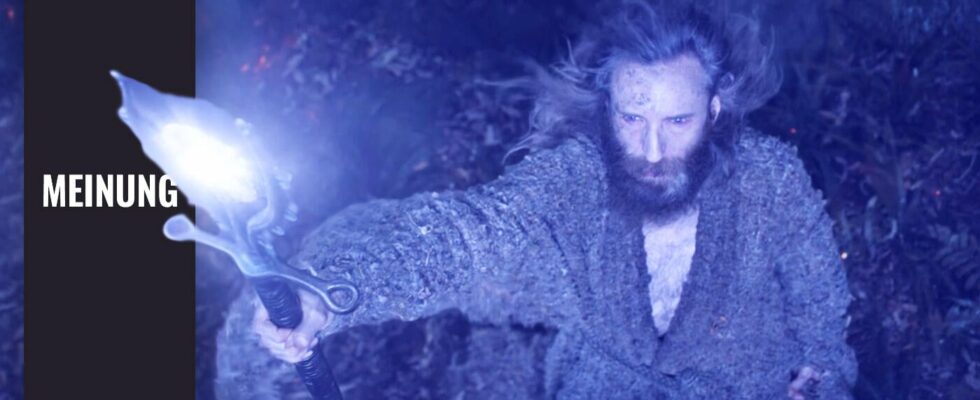At the beginning of the Amazon series The Lord of the Rings: The Rings of Power, a mysterious Stranger (Daniel Weyman) arrives in Middle Earth by comet. He is obviously a wizard (or Istar, as Tolkien calls it), wears a grey robe and befriends the hobbit ancestors of the Harfeet.
For fantasy fans who only know the War of the Ring trilogy, it is obvious: That must be a young Gandalf, right? Not so fast, little hobbit.
Many clues point to Gandalf in The Rings of Power Season 2 – and yet…
Just last week, there was a hail of new Gandalf references, of which there was no shortage in season 1. The moth/butterfly connection when casting spells or the quote “When in doubt, always follow your nose” for example. But they can be disenchanted in no time: As we see in the second season, butterflies are a general part of magic that is not character-specific. The same could apply to general Istar wisdom.
Season 2 now tries to push us even more directly towards Gandalf by using the fictional word Gand for the stranger’s wand and a character using it as part of a pun (in the English original version) as grand eleven (a large elf), which sounds suspiciously like Gandalf. But let me remind you that the first season was just as cheeky in suggesting that the stranger could be Sauron. First through imagery, when he landed in a fiery eye in Middle Earth, and later when (confused) characters addressed him directly as Sauron.
Why do I argue so vehemently against the stranger as Gandalf? Because in Tolkien’s legendarium News from Middle Earth * there is one (or two) much better options. And if the Rings of Power showrunners know what they are doing, ideally they should choose that alternative.
Lord of the Rings fans could be in for a big surprise
Tolkien purists have argued since the beginning of the series that Gandalf did not come to Middle Earth before the Third Age. He therefore has no place in the Second Age of The Rings of Power series. In addition to him, however, other Istari came to Middle Earth who belong to the angelic Maiar beings from Tolkien’s mythology: Radagast the Brown, Saruman the White and two blue wizardswho already opposed Sauron in canonical times.
Here you will find an external content from Twitterthat complements the article. You can display it and hide it again with one click.
Professor Tolkien wrote the least about the two blue wizards and they have not appeared in any adaptation so far. This should make them the most interesting for the series showrunners, unless they just want to gain nostalgia points with more popular characters. Here is what we know about the Alatar and Pallando or Morinehtar and Rómestámo known magicians:
So if the stranger is one of the blue wizards who must canonically fail against Sauron, the second blue Istar could be the “dark wizard” played by Ciarán Hinds. He has already turned evil in the series and founded a magic cult in eastern Rhûn. That he could be Saruman himself would be even more difficult to justify, since he only goes over to Sauron’s side much later.
If the stranger is Gandalf instead of the blue wizard, I get the blues
The story of the two blue Istar has effectively already been adapted with the Stranger and the Dark Wizard. No matter what names come out in the end. My current assessment and fear: The showrunners delve deep into the mythology of the legendarium for nerd points, but then leave it at that and reveal the stranger at the end to be everyone’s favorite wizard with a plagiarized origin story.
On the one hand, I believe this because the naming of the stranger has become so loaded with meaning that anything other than a big player would disappoint many. On the other hand, I have unfortunately lost some faith in The Rings of Power. While I was able to grudgingly overlook the half-gallant Tolkien recycling and regrettable Jackson references in the first season, season 2 with its constant cross-references and quotations is slowly becoming too much for me. A little more faith in one’s own work and a little more originality are needed when filling out the Second Age.
In a letter to a friend and publisher, which can be read as a preface to Silmarillion * Tolkien once imagined how he would describe some aspects of his fictional world only vaguely, perhaps leaving the formulation to others:
I would draw some of the great stories in their entirety and many would only be classified and outlined in the scheme. The cycles should be connected to a majestic whole and yet Leave room for other heads and handswho master color, music and drama.
Those heads and hands are you, dear Rings of Power showrunners. Don’t just cling to the familiar like a raft for fear of drowning in the legendarium. Because I’ve heard that you can encounter dark characters on them.
The Rings of Power in the podcast: Is season 2 of the Lord of the Rings series worth watching?
After a two-year break, Amazon’s big fantasy series The Lord of the Rings: The Rings of Power is back. We discuss what makes Season 2 different and whether the first three episodes are convincing.
At this point you will find external content that supplements the article. You can display it and hide it again with one click.
After the revelation of the villain Sauron, the cards in Middle Earth are reshuffled. Esther and Mario view the result of the second season with very different perspectives. A spoiler-free first podcast part is followed by a series review with a more in-depth Lord of the Rings analysis.
*. If you make a purchase via this link, we receive a commission.
